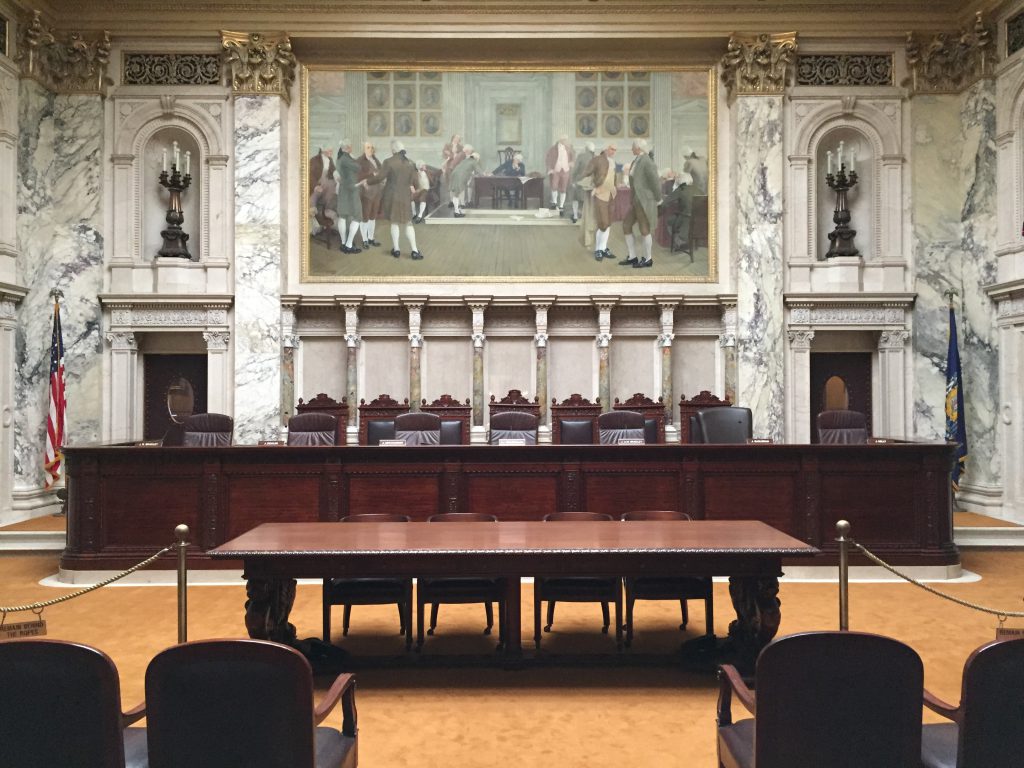WI Supreme Court Upholds GOP Lame-Duck Laws
For second time, the state's high court rules in favor of laws stripping some of governor's powers.
The Wisconsin Supreme Court has ruled for a second time to mostly uphold Republican-backed laws that limit the power of Democratic Gov. Tony Evers and Attorney General Josh Kaul.
In an opinion issued Thursday morning, the court ruled against a union group that argued laws passed during December 2018’s lame-duck legislative session violate the state constitution’s separation of powers guarantee by infringing on the executive branch’s authority.
The laws upheld by the court’s decision do things like place legislative approvals on government actions formerly overseen exclusively by the governor, including leaving federal lawsuits or seeking federal waivers to implement state laws. Those changes make it harder for the governor to do things like change Wisconsin’s voter ID law or Republican-backed work requirements for food stamps and Medicaid.
In the court’s majority opinion, Justice Brian Hagedorn wrote the union group didn’t prove all applications of those lame-duck limits are unconstitutional.
While the court upheld the majority of the laws outlined in the case, it struck down a measure passed during the lame-duck session related to so-called “guidance documents” — public information documents written and released by the governor’s administration.
The lame-duck change put more legislative approval requirements on those documents, which the court found to be unconstitutional.
“We conclude that when the legislature prohibited the executive branch from communicating with the public through the issuance of guidance documents without first going through a pre-clearance process and including legislatively-mandated content, it invaded the executive branch’s exclusive province to ‘take care that the laws be faithfully executed,'” Justice Daniel Kelly wrote in the court’s majority opinion on the issue.
Other measures approved during the session put limits on Kaul’s authority.
One lame-duck law requires the attorney general to seek approval before settling any lawsuits involving the state. That has led to a standoff between Kaul and GOP lawmakers, affecting a number of cases, some of which could bring millions of dollars into state coffers.
The lame-duck session was held shortly after Evers was elected to replace Republican Gov. Scott Walker. Republicans have defended the changes as a way to ensure an appropriate balance of power between the Democratic governor and attorney general and GOP-controlled Legislature.
Responding to the ruling on Thursday morning, Evers said Republicans have been working against him since his election, calling them “sour grapes.”
“We had a race for governor in 2018. I won. Unfortunately, things got off on the wrong foot because Republicans immediately passed a law overriding the will of the people and the election, and they’ve been sour grapes ever since,” he said.
Kaul said he believes there will be future challenges to the lame-duck laws.
Meanwhile, Republican Senate Majority Leader Scott Fitzgerald, R-Juneau, and Assembly Speaker Robin Vos, R-Rochester, lauded the Supreme Court’s decision.
“Today’s ruling is a victory for the Legislature and all Wisconsinites who want to hold government accountable,” Fitzgerald said in a prepared statement. “A rogue attorney general can no longer unilaterally settle away laws already on the books and unelected bureaucrats can’t expand their powers beyond what the people have given them through their representatives.”
Vos said the ruling “reaffirms that each branch is equal to the other.”
“This idea runs counter to what the governor and attorney general seem to believe,” Vos said. “They deem the executive branch is the most important one and should unilaterally rule over the state.”
The case is one of four legal challenges to the lame-duck session.
The Supreme Court ruled in favor of GOP lawmakers in the other state-level legal challenge to the lame-duck laws in June 2019. A federal appeals court last month ruled mostly in favor of the GOP in a long-awaited case that dealt specifically with voting law changes. A second federal challenge is awaiting a decision by the 7th Circuit Court of Appeals in Chicago. The court heard arguments in that case on May 18.
Wisconsin Supreme Court Upholds GOP-Backed Lame-Duck Laws Limiting Power Of Governor, AG was originally published by Wisconsin Public Radio.
More about the Lame Duck Laws
- Supreme Court Hears Case on Legislature’s Power - Sarah Lehr - Apr 3rd, 2025
- Four Years Later, State’s Lame Duck Law Still Faces Court Challenge - Shawn Johnson - Jan 17th, 2023
- Judge Rules Against Law Giving Legislators Power Over Attorney General Settlements - Shawn Johnson - May 11th, 2022
- State Supreme Court Dismisses AG’s Lame-Duck Lawsuit - Ruth Conniff - Mar 25th, 2021
- Kaul Sues Legislature Over Lame Duck Laws - Melanie Conklin - Nov 24th, 2020
- AG Kaul Announces Legal Action to Allow DOJ to Again Enforce Wisconsin Laws Without Unconstitutional Legislative Interference - Josh Kaul - Nov 23rd, 2020
- Vos Thinks Lame-Duck Session Didn’t Go Far Enough - Melanie Conklin - Jul 31st, 2020
- The State of Politics: Court Rulings Against Evers Sow Confusion - Steven Walters - Jul 20th, 2020
- Court Tosses Dems’ Lame-Duck Suit - Laurel White - Jul 16th, 2020
- Op Ed: State High Court Nullifies 2018 Election - James Rowen - Jul 12th, 2020
Read more about Lame Duck Laws here






















